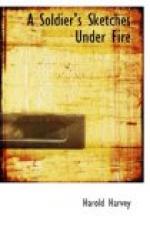A NIGHT RELIEF.
Duty in the trenches and rest and sleep in our billets in their rear alternated with something like regularity, but it was a regularity always liable to interruptions, such as were necessitated by not infrequent exigencies.
For instance, we had just got back to the latter one night, at exactly 10.30, after seven consecutive days in the trenches of our most advanced position, and were thinking that now we should get a few hours’ quiet repose—subject, of course, to the disturbance of shelling—when a sudden order was given to fall in. We turned out, were numbered, “right turned,” and marched off, singing and whistling merrily. After proceeding in this fashion for half a mile, word was passed down to form Indian file, seven paces apart. We moved thus for about a quarter of a mile, and then word was again passed down—“no smoking, whistling, or talking.” The night was pitch dark, foggy, and a drizzle was beating in our faces.
We were now within range of the enemy’s rifle fire and heard spent bullets as they pinged and spluttered into the mud. We crossed a railway line, and marched or crawled the best way we could along the ditch parallel with it—truth to tell, cursing and swearing. We passed an old signal station, now just a pile of bricks, with one side wall still erect and one glass window intact. We had come to know well that wall and that window and the strewn bricks around, for we had passed the spot so often in our little excursions from trench to billet and billet to trench. A little further along the whistle of the bullets grew louder and more continuous—their sound something like the sound of soft notes whistled by a boy. Machine guns—“motor bikes” in our nomenclature—rattled our left and right, our position being that of the far apex of a triangle, exposed to inflated fire all the way up.
Arriving within a few yards of the opening of the trench we were to occupy in relief of the North Staffords, the first section of whom were moving along the ditch, a star shell burst above as the searchlight was turned on, and every man stood stock still till all was dark again.
Between men of the incoming and outgoing battalions such casual greetings were exchanged as: “Wot’s it like up here, matie?”; “’Ow are yer goin’, son?”; “Yer want to keep your ’ead well down in this part—it’s a bit ’ot”; “So long, sonnie.” Sprawling, ducking and diving, we got in, and “safe” behind the sandbags. Just as my chum and I had entered the dug-out, and were preparing to make ourselves comfortable, as our turn for sentry-go would not be for two hours, the sergeant shoved his head in and shouted that we were wanted for a ration party.




